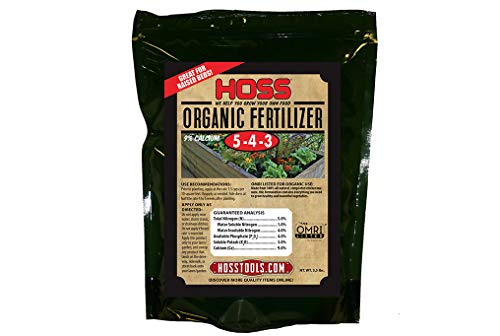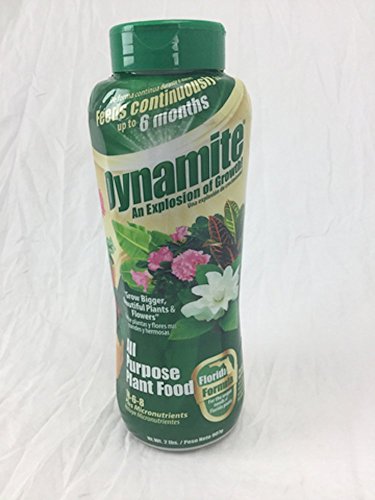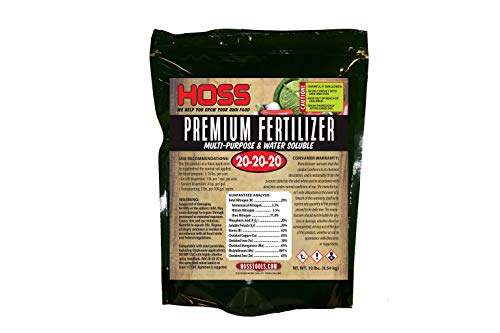Apricots are a sweet, summery, and healthy treat, and growing your own is a rewarding experience. You’ll need to use fertilizer to help your apricot tree thrive so that its fruit can flourish.
Your tree’s needs will vary depending on the environment, so read on to find out about the best apricot tree fertilizer for you.

Our Top Picks
Best Overall:
Dr. Earth Natural Wonder Fruit Tree Fertilizer
Best Organic Apricot Tree Fertilizer:
Complete Organic Fertilizer
Best Apricot Tree Fertilizer for Convenience:
Jobe’s Fruit and Citrus Tree Fertilizer Spike
Best Overall
Dr. Earth Natural Wonder Fruit Tree Fertilizer
The ideal apricot tree fertilizer balances the three macronutrients as well as the major micronutrients and is designed for fruit trees specifically, and is made with natural ingredients. This fertilizer combines all of these factors with additional built-in protection against pests and diseases.
Pros:
- It has a superior blend of feather meal, fish bone meal, cottonseed meal, kelp meal, alfalfa meal, soft rock phosphate, mined potassium sulfate, and seaweed extract.
- It’s specifically designed for fruit trees, including apricot trees.
- It will stimulate hearty root development.
- It has TruBiotic soil microbes.
- It’s organic and non-GMO.
- It’s one of the most budget-friendly apricot tree fertilizer options available.
Cons:
- The 5-5-2 nutrient ratio is unbalanced, though it does emphasize the all-important nitrogen.
Best Organic Apricot Tree Fertilizer
Complete Organic Fertilizer
Organic fertilizer is especially important when growing trees whose fruit you intend to consume. It can be made with chicken compost, like this one, which includes a balanced blend of nutrients.
Pros:
- It includes multiple nutrients, including 5% Nitrogen, 4% Phosphorous, 3% Potassium and 9% Calcium.
- The high calcium content will help with fruit production.
- It’s OMRI registered for certified organic production.
- The granular formulation makes it easy to apply to the soil.
- It’s perfect for small-scale gardens.
- You can use it in your favorite container garden or raised bed garden.
Cons:
- It is not specific to fruit tree growing.
- The nutrients are not balanced in an equal ratio of N, P, and K.
Best Apricot Tree Fertilizer for Convenience
Jobe’s Fruit and Citrus Tree Fertilizer Spike
This is an original, easy-to use alternative to traditional fertilizer. Instead of a crumbly substance, this fertilizer is a solid spike that you hammer into the ground for a continuous release of nutrient supply to the tree’s root system.
Pros:
- It prevents plant burn.
- It’s specifically formulated for fruit trees.
- There’s no mixing or measuring necessary.
- It prevents chemical runoff.
Cons:
- It is not pet friendly.
- It’s not organic.
- 9-12-12 is lower in nitrogen than competitors.
Best Apricot Tree Fertilizer for Indoor Apricot Trees
Dynamite All-Purpose Plant Fertilizer
This fertilizer is granular, making it easy to apply to an indoor potted apricot tree. It is designed to be used in all seasons, helping you care for your tree indoors, where the climate is more consistent than it would be for outdoor growing.
Pros:
- It reduces the risk of over-feeding or burning after lawn care.
- It reduces the amount of excess fertilizer that ends up in groundwater.
- It contains essential macronutrients and micronutrients for healthy plants.
- It feeds for up to 9 months, which means you only have to feed once per season.
- It has a 13-13-13 fertilizer analysis.
Cons:
- It is not formulated specifically for fruit trees.
- It is not organic.
Best Apricot Tree Fertilizer for Younger Trees
Chilean Nitrate Fertilizer

In the first two years of its life, apricot trees need little fertilizer. After that, a nitrogen-heavy fertilizer is a great choice as the tree begins to bear its first fruit.
This fertilizer has a good quantity of nitrogen in its nutrient mix, making it ideal for younger trees. Apply about 1 cup per inch of the diaper of the trunk and then water well.
Pros:
- It is organic.
- It is water soluble.
- It contains essential micro-nutrients, including iodine and selenium.
- It increases the amount of protein, albumine, amino acids, vitamin B, carotin and micro-elements in the soil.
Cons:
- It requires more frequent reapplication.
- It has a non-fruit-tree specific formula.
Best Apricot Tree Fertilizer for Older Trees
20 20 20 Garden Fertilizer
Older trees no longer need to grow taller, which reduces their nutrient needs, but they sometimes show signs of their age through reduced fruit production. You can slow this process with the right fertilizer. A balanced fertilizer, like a 20-20-20 applied in either one 6 pound annual application or two 3 pound semi-annual applications should help. This fertilizer is particularly well balanced.
Pros:
- It has a water-soluble formula.
- It’s ideal for all stages of growth but particularly for later tree life stage.
- It’s adaptable to outside temperatures.
Cons:
- It is not formulated specifically for fruit trees.
Why Fertilize Apricot Trees?

Fertilized fruit trees have the right balance of nutrients to ensure fast growth and plentiful fruit production. The fertilizing needs of your apricot tree will depend on the soil acidity and quality, whether you grow your tree indoors or outdoors, the season, the tree’s age, and other factors.
Fertilizers can be synthetic or organic. In general, apricot trees need a healthy balance of Nitrogen (N), Phosphorous (P), and Potassium (K).
Each of these serves a different purpose, with the first targeting leaf and branch growth, the second supporting root and blossom development, and the last encouraging disease resistance.
Now that you know why fertilizers are good for your apricot trees, it’s time to share our favorite picks for apricot tree fertilizers.
What to Consider When Choosing the Best Fertilizer

Nutrients: Macro and Micro, and Ratios
Fruit trees prefer organic fertilizers high in nitrogen, ideally with a balanced macronutrient ratio of N, P, and K.
Soil quality
Test the soil you are growing your apricot tree in for zinc or potassium deficiencies that could slow growth. The right fertilizer can compensate for this.
Acidity
Soil pH should be neutral to slightly acidic, ideally about 6.5 for optimal fertilizer nutrient intake.
Climate
Apricot trees grow well in USDA plant hardiness zones 6 and higher and do exceptionally well in California, where 95 percent of America’s apricot trees grow. Trees planted in less-than ideal outdoor climates or indoors have different nutrient needs.
Frequently Asked Questions

What is the best way to store fertilizer?
Fertilizer should be stored in dry, cool, shaded places. Seal the container tightly to keep moisture out and smells in. It’s important to keep the fertilizer in its original bag so that you know which fertilizer is meant for which use.
What is the difference between fertilizer and organic soil amendments?
Organic soil amendments can include blood meal, soybean meal, composted chicken manure, cottonseed meal, and feather meal, and other compost all of which are high in nitrogen.
Fertilizer is specially formulated synthetic or organic material designed to optimize your plant’s growth, or in this case, fruit tree. Fertilizer is, therefore a kind of organic soil amendment.
When is it best to begin using fertilizer?
Do not use fertilizer for for the first two years after planting your apricot tree. Then, in the spring, begin to apply fertilizer, particularly if the tree is growing slowly, which would be less than ten to twenty inches per year.

How much fertilizer do I use?
The best way to determine the quantity of fertilizer your apricot tree needs is by calculating it based on the tree’s age and size and the fertilizer’s nitrogen value.
Apricot trees need 0.10 pounds per year of age, or per inch of trunk diameter measured 1 foot above the ground. Do not exceed 1 pound of nitrogen annually.
Should I fertilize apricot trees in the colder months?
No, it’s best to stop adding fertilizer around July until the spring, and then continue using fertilizer through the summer. How frequently you reapply depends on the nutrient quantity in your chosen fertilizer.
How do I apply fertilizer?
There are two methods. The first entails starting about twelve inches from the trunk and then applying the fertilizer evenly until the permitter of the tree’s furthest reaching branches, also called the drip line.
The second method is to dig small holes about six inches deep and a foot to a foot and a half apart and then sprinkle fertilizer into each of the holes for maximum absorption.
Enjoy the Effects of One of These Best Apricot Tree Fertilizers
Now you know how to decide which fertilizer to choose to help your tree grow tall and produce lots of delicious fruit.
Excited for more apricot content? Then check out my apricot page for more info guides, growing tips, recipes, and more.





